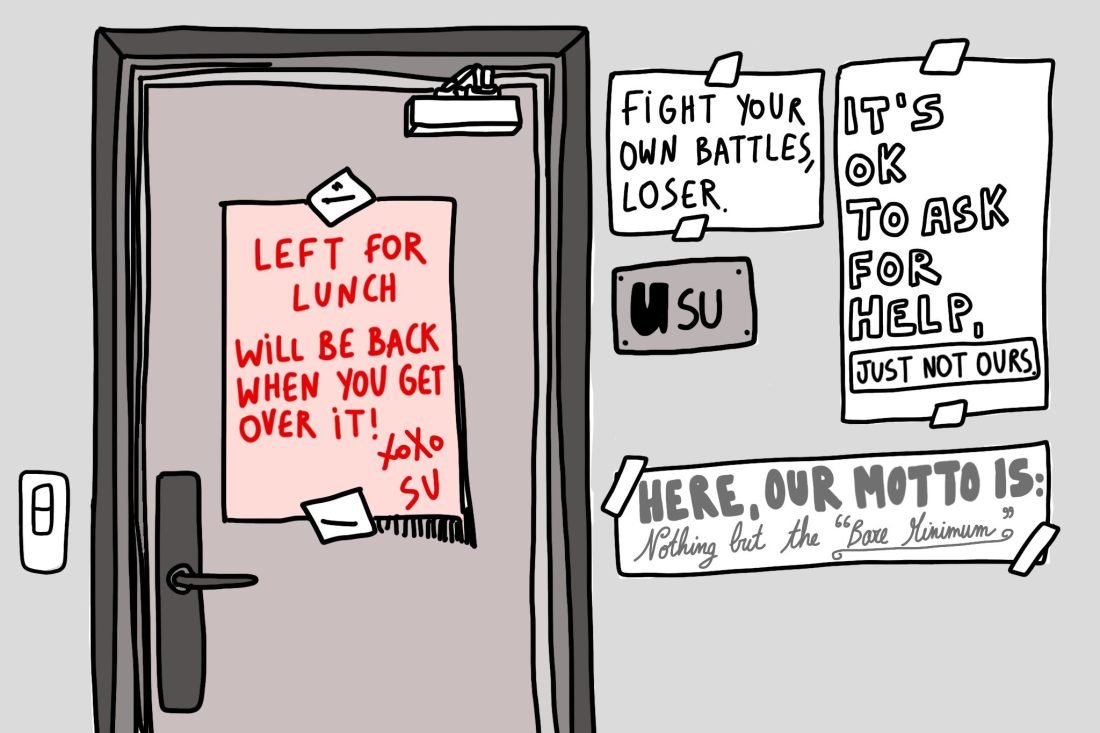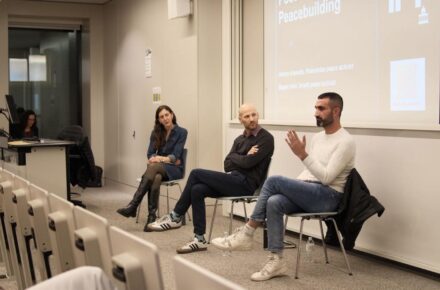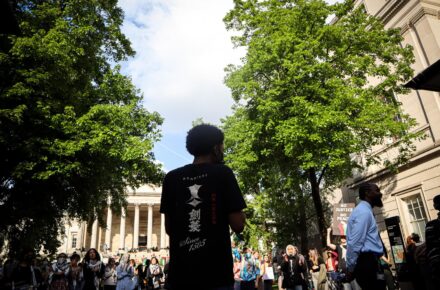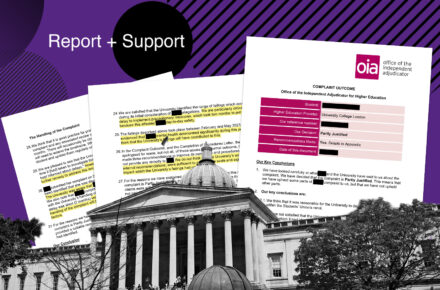Mads Brown and Zhenya Robinson
Content warning: discussions of sexual assault and mental illness
[‘Report + Support’] doesn’t exist to help students. It exists to protect UCL from reputational damage. The caseworkers don’t need to decide whether or not I’ve been assaulted. They need to decide whether or not it’s a big enough deal. It’s not a system made to make sure students get justice. It’s made to make everything nice and tidy.
The students in this article have been given pseudonyms to protect anonymity.
It’s the early hours of a cold October morning. A long queue of twenty-somethings curls round a boxy black building. Jostling like sardines, their hands fumble for cigarettes and cheap vodka. For most, they’ll remember little more than the inevitable hangover the next morning – their regrets contained within a few glass cylinders. But as night turned to day, a few unforgettable hours changed the trajectory of Cameron’s life.
Everyone knows sexual assault happens. Most people know someone who’s been sexually assaulted. But despite the harrowing statistics, no one expects it will happen to them.
Before coming to university, I’d heard a lot about how these kinds of things happen, and that the universities are more concerned with protecting their reputation than their students. But I didn’t expect to be the frontline of it, especially with my background. I experienced sexual assault as a teenager, and experiencing it again was just another added layer of shit to deal with.
Cameron was in their second-year of study at University College London (UCL) when they were sexually assaulted by one of their closest friends in the queue to Egg – a renowned North London club.
Coming from a small town, Cameron was overjoyed at the prospect of making new, queer friends at university in London. ‘Oh my God! There’s gay people here!’, they remember thinking after a series of Discord calls with their soon-to-be coursemates.
But on the other end of the call, different impressions were beginning to take shape.
Just a few weeks into meeting, Cameron would find out that Rory – a fellow student and flatmate – was looking for slightly more than friendship from the moment they met. To Rory, Cameron was simply ‘a gay girl I can fuck’.
At the time, the comment was laughed off – explained away by Rory’s flirtatious personality and added to a long list of remarks now tinged with retrospect. ‘They’d always been quite flirty’, Cameron told us, ‘but it felt sinister from time to time’.
These quips weren’t reserved for just Cameron either. Sophie, a friend of Cameron’s who sat in on the interview, remembers how Rory ‘used to make comments on my chest all the time’, comments like, ‘you look hot – it’s the hair and the tits’.
These comments weren’t the first time that Rory had made Cameron feel uncomfortable. During Freshers Week, they had made a series of advances on Cameron which, though brushed off at the time, began to seem increasingly threatening as the months went by.
At a Freshers’ Ball a couple of days into term, Cameron’s initial excitement, enhanced by what they described as a ‘baseline crush’ on Rory, soon subsided.
‘We were dancing, it was the three of us – the person that assaulted me [Rory] and our really good friend’, explained Cameron. Reflecting on the sequence of events which followed, Cameron emphasised how ‘sudden, and very out of the blue’ Rory’s behaviour was.
Though it started off as ‘jokey dancing’, Cameron very quickly realised they were being ‘groped in the middle of a dance floor’. They felt their dress coming up, and despite their best attempts to pull it down with their hands, ‘nothing was really working’.
Cameron was led to believe ‘that we were both fucked out of our minds’, but they later found out Rory had only consumed a couple of drinks. In a thought process which Cameron attributes to their intoxicated state, they decided to kiss Rory in the hopes that this would stop the incessant groping. ‘But it just got worse’, Cameron told us.
It wasn’t until long afterwards, once Rory had developed somewhat of a reputation for making inappropriate comments and non-consensual advances, that Cameron realised what had happened that night.
Early on in first year, Cameron and Rory ended up in Wetherspoons following a derailed club night. Cameron opened up to Rory, sharing their experience of sexual assault as a teenager. In response, Rory divulged the more intimate details of the hellscape secondary school can be for young queer people. They relayed a rumour that was spread about them: that they were predatory towards girls.
Cameron remembers sympathising with Rory, ‘people say that shit about lesbians all the time, that really sucks’, they responded. ‘But looking back with the context of everything that’s happened now, maybe there was some validity to it?’
It wasn’t all inappropriate remarks and unsettling rumours though, Rory’s behaviour was oftentimes incredibly hard to manage. Cameron noted that Rory had been diagnosed with several mental illnesses. As a result, they would often experience episodes – many of which Rory claimed they were completely unable to recall.
These often involved Rory trying to hurt themselves – a distressing experience for anyone to go through or indeed witness, let alone such a close knit group of friends. Cameron remembers the first time it happened in detail, ‘they crouched down outside a pub and started trying to hit themselves in the head’.
Concerned for Rory’s safety, Cameron thought walking home would be out of the question. ‘So, we got an Uber. And then Rory threw up in the Uber. The Uber kicked us out’, they recalled. Eventually, the pair were forced to trek back to student halls on foot.
Whereas Cameron remembers having to walk on eggshells for months afterwards, Rory moved on as if nothing had happened – something which their friends were too scared to question for fear of triggering another episode.
It was at this point that Cameron began to feel uncomfortable around Rory, an emotion which they struggled to understand. ‘I’m autistic, so I have trouble processing that kind of thing’, explained Cameron. Instead, they thought it was their own ‘internalised shit’ causing them to feel this way – ‘if a lesbian wants to kiss a bunch of girls in a club, let ‘em do it’, Cameron rallied with themselves at the time.
The friendship continued into second year, and as Halloween passed by so did another round of Freshers events. But a night that was supposed to be filled with the carefree joy of clubbing with friends quickly devolved into something which would haunt Cameron for months to come.
At pres, Rory was already exhibiting concerning behaviour. Their intentions for the night were clear – they were excited to go clubbing again so they could ‘get some’.
As Rory became increasingly intoxicated, chatting up every girl that walked in and drunkenly rambling to Cameron, they said something which set an ominous tone for the night ahead: ‘I want you to know that I’m not going to try and fuck you. I want to get some, but not with you.’
By the time Rory made it to the club queue, they were ‘slurring and stumbling and crashing into people’. The series of events which followed was all too familiar. Turning round to see Cameron, Rory forced their body weight onto them. Cameron was torn; they felt compelled to help Rory – someone who they knew so well, but their boundaries had been completely violated.
‘One hand went for my waist and one hand went for my tit’, Cameron explained. ‘I just remember random grabbing and then them kissing my neck […] I thought, if I push them off, they’re going to fall on the floor’.
Cameron expressed how intuitive it felt from Rory’s end. They began ‘groping my chest, bum, hips, waist […] like they’d found a body and went – grab.’
‘I managed to turn them around so we were side on, and their hand was grabbing me on the side of my boob. I was laughing. But then I started crying.’
As they attempted to hold Rory up, Cameron only further risked their own safety. ‘I was in shock. Half really upset, half concerned about them; half worried, half selfishly thinking: my night’s ruined, I’m going to have to look after [Rory] now’, Cameron explained.
Cameron was forced into what they dubbed ‘damage control mode’. In an attempt to reassure themselves they remember thinking ‘okay, we’ve done this before, I’m going to have to do it again’. Despite repeated advances, Cameron was forced to repress the truth of how they felt for the sake of the friendship.
Struggling to fully acknowledge the severity of the situation, Cameron’s experience is all too common amongst sexual assault victims – especially those who know their perpetrator personally.
Not only had Cameron been assaulted, but they also had to provide support – mental and physical, to the very person who’d just betrayed their trust and violated their boundaries. Intent on making it into the club, Rory proceeded to collapse into three people, all of whom ‘fell on the floor like bowling pins’.
Shouts of ‘you should get them home!’ roused from the surrounding crowd. All Cameron could muster was, ‘I’m trying’ in response – ‘I was really fucking trying’, they told us.
Once Cameron and their friends eventually made it into the club, they lost sight of Rory. That is, until a sequence of texts pinged through, the last one reading: ‘Come help me please. I’m in the Medic room. Please come’.
After being escorted out of Egg, it became clear to Cameron that Rory was, once again, in desperate need of help. Incredibly upset and triggered by their experience, Rory became wary of everyone around them, fearing that even their friends could be a threat to their safety.
Seeing Rory so distressed pushed Cameron and their housemate – Charlie, to tears. Still crying, they worked together to get Rory home safely.
Eventually we coaxed Rory toward the side of the road. I called an Uber. I felt like I was the only one that Rory trusted. They were backing closer and closer to the road, so we all sat down on the pavement waiting.
Though everyone did get home safely in the early hours of that morning, it was just the beginning of a nightmare for Cameron.
It was Charlie – the friend who helped Cameron calm down Rory that unforgettable night, whom Cameron first told about the assault. At the time, they were reluctant to label it as such, sharing that they were ‘still coming to terms with it’. In an effort to underplay Rory’ actions, Cameron instead said that they had simply ‘pushed by boundaries a little bit’ when in reality, Cameron was just ‘doing a lot of work to avoid the term assault’, they reflected.
Rory, according to Cameron and their mutual friends, would always brush off any conversations concerning their behaviour, despite being repeatedly approached about their reckless and inconsiderate choices. However, after taking months to process their experience alongside Rory’s history of inappropriate comments, Cameron knew it was time to initiate a conversation.
What you did outside Egg, it ‘fucked me up’, Cameron remembers saying. According to Rory, the last thing they remember about the day was an afternoon lecture. Hearing what they did for the first time, Rory dismissed the allegations. Rory seemed relieved – I thought it would’ve been ‘much worse’ they replied. Brushing over their blatant assault of Cameron, Rory abruptly ended the conversation, saying ‘okay, that’s all I need to know’.
Not only did Rory deny the sheer impact of their actions, but they also misled their housemates, claiming that Cameron’s account of the night was completely exaggerated. Yet, as always, the truth came out. Within a matter of weeks, Rory had moved back home with their parents.
Whereas Rory got the chance to escape, Cameron was stuck. It was only now that Cameron realised the devastating impact that Rory’s actions had made on them. A feeling of persistent unease and fear began to seep into their everyday life. ‘If I see [Rory] on campus, I’m gonna freak out. I can’t do that’, Cameron remembered thinking at the time.
Hoping for emotional guidance and justice of some kind, Cameron turned to the UCL ‘Report + Support’ services. However, they were met with the complete opposite. According to Cameron, there are no real instructions from UCL – ‘you’re just left to your own devices’. Cameron was simply told to just ‘write a victim statement’.
Cameron decided to cover all bases. They began accumulating evidence (text messages between them and Rory, between Rory and their friends, between Cameron and their friends and so on). They also provided five witness statements, each at least a page long, intricately describing what happened at Egg alongside Rory’s history of inappropriate behaviour.
Cameron was immediately told that a response could take 6 to 8 weeks. In the interim, they weren’t offered any form of counselling from UCL. A couple of months later, the statement was, to Cameron’s surprise, escalated.
Initially, they were met with an extremely sympathetic and supportive member of staff. The first thing to leave her mouth was – ‘we believe you’, three words which meant more anything to Cameron.
That, however, is where Cameron’s good experiences with ‘Report + Support’ came to a halt.
After weeks of waiting on a response from more senior staff, Cameron was informed that all witness statements were dismissed entirely, on the basis that they were ‘biased’ and contained ‘elements of bullying’. Cameron was left shocked and horrified, their trust once again betrayed – this time by their own university.
Cameron was able to recite a direct quote from the email stating that their case had been dismissed. ‘It will be burned into my brain forever’, Cameron told us.
The lines of consent had been blurred and / or misinterpreted.
The interview room fell silent upon hearing this.
‘She said there was some kind of fluidity in our friendship’, Cameron went on to explain. In response, Cameron informed the caseworker of how this response goes against UCL’s very own guidelines. ‘Also’, they told us, ‘can you please elaborate on what the fuck you mean by bullying?’
Cameron was never offered another in-person appointment. Rory, on the other hand, was entitled to further discussion with the senior caseworker. Though Cameron doesn’t know exactly what was said, they fear that it was this conversation which completely jeopardised the outcome of their case.
‘I’m not quite sure how one conversation overrides six points of view […] How can you take one person’s word as gospel when six people have said, ‘no, this is what has happened’?’, reasoned Sophie – Cameron’s close friend who was there to support them throughout the interview.
With the witness statements discarded, there was virtually no basis for Cameron’s claims. The report was subsequently interrupted and the case closed.
In compensation, a ‘restraining order’ – applicable on UCL’s premises, was implemented. This means that Cameron and Rory aren’t allowed to be in the same classes.
However, understandably, the lengthy process of writing statements, appealing the case, back-and-forth emailing and attempting to mentally deal with the trauma, took a toll on Cameron’s education.
Despite managing to turn up to a couple of their first exams, Cameron soon realised that pushing through was doing more harm than good. Following discussions with their Head of Department, Cameron was led to believe that taking a year out would be the best course of action.
However, if a student disrupts their studies, they don’t have access to any mental health services provided by the University. Shockingly, there is also virtually no appeal process within ‘Report + Support’. Once a senior officer makes a decision, it can’t be challenged. ‘It’s a locked decision’, Cameron explained, ‘you can only complain about the way in which the case was handled, not the outcome’.
Ultimately, Cameron expressed how the rigorous process pushed them to the brink. ‘I felt like I was being worn down’, they told us. It was almost as if the University was just waiting, hoping that Cameron would eventually give up. Cameron commented that if anything, the case itself was treated more like an argument between friends rather than incident of sexual assault. In other words, it hadn’t been taken seriously at all.
Though Cameron’s experience was horrifically invalidated and eventually filed away, it wasn’t just the outcome that they were disappointed with. ‘It’s such a long and convoluted system’, Cameron explained, ‘the guidelines they give you to read are so full of jargon and random nonsense. It’s not accessible at all.’
Throughout the process, Cameron felt as though they were ‘brushed aside and left out in the dirt. Rory got to continue with their studies with little to no consequences.’
It was never about revenge or an attempt to seek attention for Cameron, all they wanted was for their experience to be taken seriously. Cameron explained that ‘having [the assault] recognised would have been enough’. But all they experienced was ‘just UCL pulling out 1950s bullshit about consent’.
At present, Cameron is living at home, taking a year out from the degree they were once so passionate about. As a result, they’re unable to access student finance or University counselling services, despite still having access to UCL buildings and libraries. Unable to pay for private therapy, and at the mercy of an ever-increasing NHS waiting list, the impact which Rory’s actions still have on Cameron’s life speaks for itself.
In an attempt to view their circumstances positively, Cameron expressed that interrupting has been ‘a blessing in disguise because I’ve had time to rest. But it would have been so much more appreciated if it had been on my own terms’.
According to Cameron’s friends (all of whom are now in their third-year of study) Rory is still on campus, likely repeating second year. Both Cameron and Rory study the same subject, meaning that when Cameron returns to UCL, they’ll share modules with Rory.
Though Cameron is convinced Rory would walk the other way if the two crossed paths, the ‘genuine fear of seeing [Rory]’ is yet to fade away. ‘Best case, they would’ve been expelled’, Cameron revealed to us, ‘but I know the way these systems work’.
As the interview drew to a close, Cameron emphasised just how horrific the past year has been for them. ‘It’s a harrowing process, having to recount everything multiple times to multiple people’. Gesturing towards Sophie, who supported them through the whole process, Cameron said – ‘you all keep telling me: you’re still hanging on somehow!’
Having been through the ‘Report + Support’ process, Cameron doesn’t believe that it’s purpose is for the benefit of the survivors themselves:
[‘Report + Support’] doesn’t exist to help students. It exists to protect UCL from reputational damage. The caseworkers don’t need to decide whether or not I’ve been assaulted. They need to decide whether or not it’s a big enough deal. It’s not a system made to make sure students get justice. It’s made to make everything nice and tidy.
UCL’s ‘Report + Support’ is fundamentally flawed. Before survivors are entitled to support, they are first forced to navigate convoluted and unclear reporting guidelines. Those who do manage to provide substantial evidence – a process which is incredibly mentally taxing, are ultimately invalidated. As for the perpetrators, they’re provided with protection and allowed to seamlessly re-transition back into life at UCL.
Though some individuals in the process are empathetic and compassionate, as demonstrated by Cameron’s experience with a supportive member of staff, the system as a whole is void of transparency, fairness, and sensitivity. The absence of a clear appeal process, followed by the remarks made by the senior caseworker who dismissed Cameron’s claims, evidence this deeply disturbing trend.
We are adamant that as a University, UCL is obliged to provide flawless safeguarding and support as it has a duty of care to its students. The University should be ashamed of how badly it has failed Cameron.
We are calling for a complete restructuring of ‘Report + Support’ to prohibit such awful treatment occurring again. Not only does UCL need to ensure that individuals such as Cameron are never made to doubt how they feel, or left without help, but the system as whole must also be made more accessible.
The University has no choice but to provide clearer guidelines, with step-by-step instructions that all students are able to follow with confidence and reassurance.. Caseworkers, in particular those who are dealing with allegations which are escalated to a senior level, should be provided with intensive training.
At such an instrumental moment in a student’s life, a lack of empathy and understanding is simply deplorable.
Though this is just a start, we hope that by bringing to light these systemic failures, it will spark an incitement to change, and ensure that never again will a UCL student have to face what Cameron did.
If you’ve been affected by anything that has been spoken about in the article, or want to speak about your personal experience, The Survivors Trust provides specialist support to those who have survived rape, sexual abuse, and sexual violence.









